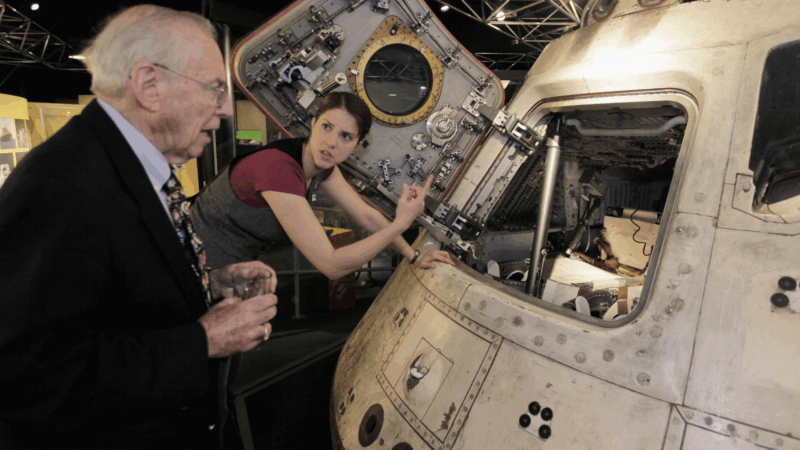Famed NASA astronaut and Apollo 13 commander Jim Lovell has died at age 97
Jim Lovell, an astronaut best known as the commander of the ill-fated Apollo 13, has died. He was 97.
NASA announced his death Friday and included this statement from his family: “We are enormously proud of his amazing life and career accomplishments, highlighted by his legendary leadership in pioneering human space flight. But, to all of us, he was Dad, Granddad, and the Leader of our family. Most importantly, he was our Hero. We will miss his unshakeable optimism, his sense of humor, and the way he made each of us feel we could do the impossible. He was truly one of a kind.”
The Apollo 13 mission almost ended in catastrophe after an explosion crippled the spacecraft and took a herculean effort to bring home the three-astronaut crew.
Lovell’s NASA career was peppered with firsts. His first flight — Gemini 7 in 1965 — set a space endurance record of almost 14 days. After Lovell commanded Gemini 12, he’d flown in space longer than any other person at that point. His next flight, Apollo 8, was the first time humans left Earth orbit.
That flight was the first to go to the moon, entering lunar orbit on Christmas Eve of 1968. As millions listened in, the crew read a passage from the book of Genesis. In a 2014 NPR interview, he said his greatest impression was not looking down at the moon but seeing the Earth from a quarter-million miles away. “Just a small ball,” he said, “blue and white. Like a Christmas tree ball hung in an absolutely black sky. I could put my thumb up and completely hide the Earth. Everything I knew was behind my thumb.”
It was Lovell’s next mission in 1970 — Apollo 13 — during which he uttered one simple but scary phrase: “Houston we’ve had a problem…”
Fifty-five hours into the flight, an explosion ripped through the service module after an oxygen tank exploded. Lovell was calm as he radioed back to mission control, “It looks to me, looking out the hatch, that we are venting something. We are venting something out into space. It’s a gas of some sort.”
The gas was oxygen. The accident and ensuing drama captivated people as NASA refused to fail. For more than three days, the crew and flight controllers labored to solve one problem after another (rising carbon dioxide levels, failing batteries, frigid temperatures) to get the astronauts home as electrical power and flight systems were stretched. Lovell wrote a book about it which was made into the 1995 hit movie Apollo 13. Tom Hanks starred as Lovell.
Lovell told NPR the movie was very realistic and captured the highs-and-lows of the mission almost perfectly. He said the actual flight was a triumph and a “successful failure [that showed how] good leadership fosters teamwork … to solve a problem.”
The near-disaster cost Lovell his only chance to land on the moon, and he said later he was disappointed.
During his life, Lovell learned about perseverance. He was interested in planes and rockets at an early age. He applied to the U.S. Naval Academy but wasn’t chosen. He tried again and was accepted. In the Navy, he flew fighters off aircraft carriers. Then he became a test pilot and tried out to be an astronaut in the Mercury program. He wasn’t selected (flunked the physical). He did make it for Gemini.
He said, “Apollo 8 was the high point of my career. As a matter of fact, it was the high point of our manned space efforts. Not so much in a technical way but in an emotional way.”
The year 1968 was turbulent in the United States. The Vietnam War was raging. Robert Kennedy and Martin Luther King, Jr. were both assassinated. Protests roiled college campuses and the Democratic National Convention. But at the end of the year, Apollo 8 reached the moon and took the famous “earthrise” picture showing the blue and white planet soaring over the barren lunar landscape. Lovell said Apollo 8 “gave the year an up beat at the end. I got a telegram from one lady that said, ‘You made 1968 because of that.'”
Lovell said one of the enduring legacies of the U.S. space program was how children became interested in science, technology and engineering. Later in life, he lamented that NASA didn’t receive enough money to be bold in human exploration of the universe.

Supreme Court appears split in tax foreclosure case
At issue is whether a county can seize homeowners' residence for unpaid property taxes and sell the house at auction for less than the homeowners would get if they put their home on the market themselves.
Top House Dem wants Justice Department to explain missing Trump-related Epstein files
After NPR reporting revealed dozens of pages of Epstein files related to President Trump appear to be missing from the public record, a top House Democrat wants to know why.
ICE won’t be at polling places this year, a Trump DHS official promises
In a call with top state voting officials, a Department of Homeland Security official stated unequivocally that immigration agents would not be patrolling polling places during this year's midterms.
Surgeon general nominee Means questioned about vaccines, birth control and financial conflicts
During a confirmation hearing, senators asked Dr. Casey Means about her current positions and her past statements on a range of public health issues.
Rock & Roll Hall of Fame 2026 shortlist includes Lauryn Hill, Shakira and Wu-Tang Clan
The shortlist also includes a 1990s pop diva, heavy metal pioneers and a legendary R&B singer and producer.
This novel about family drama is so good you may want to re-read it immediately
Allegra Goodman's new novel is called This Is Not About Us, but critic Maureen Corrigan says that title is coy: Readers are bound to see aspects of themselves and their families in these pages.








